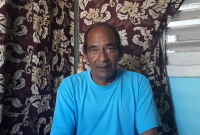“Dissidence comes from the heart; it is what one feels.”

Download image
Ariel Lafont Isaac was born on December 20, 1960, in Santiago de Cuba; however, he spent a large part of his youth with his aunt on the “Island of Pines” [Isla de Pinos]. Ariel was an excellent student, with the correct profile corresponding to the ideology of the communist regime. For this reason, he was awarded a scholarship to the “Military Academy of General Antonio Maceo Grajales” [Escuela Interarmas General Antonio Maceo Grajales] in Havana. He graduated in 1986 as a military sailor, and from 1987 to 1993, and he also worked as a State Security agent. In 1989 he received a medal from Fidel Castro for the fulfillment of a mission to the Panama Canal, in which he and his crew brought goods from abroad to Cuba while being retained for 43 days without water and food. Twenty years later, in 2009, he finally joined the dissidence movement, tired of the corrupt methods and constant lies of the Cuban regime. Today, he works in food merchandising - an illegal business in Cuba. He lives with his second wife in Santiago de Cuba.
